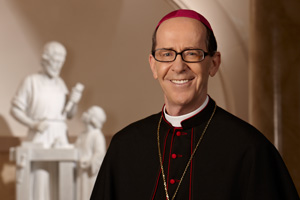
Following is the text from Bishop Thomas J. Olmsted’s homily for the March 29, 2015, Palm Sunday Mass. He celebrated Mass at Ss. Simon and Jude Cathedral.

[dropcap type=”4″]I[/dropcap]n his First Letter, St. John writes (3:16): “The way we came to know love was that He laid down His life for us; so we ought to lay down our lives for our sisters and brothers.”
The Passion of Christ is the school of love. By gazing with reverence on Jesus in His suffering, husband and wife discover how to live their wedding vows, children and parents learn how to be a family, neighbors and enemies learn how to live in harmony, and we who have sinned learn the way of mercy. In Saint Mark’s account of Jesus’ Passion, the woman who anointed Jesus’ feet teaches us how to respond to His suffering and to our own, and to the sufferings of those whom He gives us to love. Let us look, then, at 4 ways that she loved Jesus.
First, notice how her response to Jesus is the exact opposite of Judas’ betrayal and the chief priests’ treachery, and the Apostles’ cowardice. She boldly enters Simon’s house to show her love for Jesus. She allows nothing to intimidate her, to keep her from expressing without words how much she loved Him. “Perfect love casts out fear.”
Secondly, she comes with an alabaster jar of expensive perfumed oil; and with no hesitancy she breaks the jar and pours its content on His head. At once, her actions infuriate some; she is accused of wastefulness, destroying a jar of such great value, and pouring out precious oil worth 300 days’ wages. But notice that Jesus defends her action because it is not a wasteful, just as coming to Mass is not a waste of time, and providing your children with Catholic education is not a waste of money. Waste implies paying more than something is worth. Is adoration of God a waste? Is virginity for the sake of God’s Kingdom a waste? Are long hours and days and even years of caring for a disabled family member a waste? Is forgiveness of those who hate us a waste?
To love Jesus’ as He deserves is to do something scandalous by the world’s standards. But if we are not extravagant in our love of Him, then we don’t really love Him. Listen again to the two great commandments: “You shall love the Lord your God with all your heart, all your soul, all your strength and all your mind… and you shall love your neighbor as yourself.” This woman who brought expensive oil to anoint Jesus knew that love never counts the cost. Without caring about the scorn of others, “she breaks the alabaster jar and pours out her greatest treasure on Him;” as He is about to “break His own body and pour our His life for her and for all humanity” (Healy, p. 279).
Thirdly, notice that the woman anoints Jesus’ head because unlike everyone else around her she knows Him. In the Bible, this is the way that kings were crowned, and the way that priests were ordained. The Prophet Samuel, by pouring oil over the head of David, anointed him king of Israel (1 Sam 16:13); and Aaron, in the desert, was anointed priest by Moses when he poured oil over his head (Exodus 29:7). Still today in the Church, priests and bishops are anointed Sacred Chrism oil to share in Christ’s Priesthood. Moreover, every Christian at Baptism is anointed, as they begin to share in the kingship and royal dignity of Christ.
It is significant that, at no other time in the Gospel is Jesus literally anointed with oil; and notice that it takes place immediately before Jesus, acting as the Priest institutes the Eucharistic Sacrifice and offers Himself for us on the Cross, while literally wearing a crown, and having a sign posted over His head that read: the King of the Jews. Why is it that no one, except this woman recognized Jesus as King of Kings and High Priest of the New Covenant? Love sees what no one else sees. We shall never understand who Jesus is, we shall never understand love unless we gaze in awe and reverence on the Cross.
Fourthly, this woman’s name is not known. For all time, she shall remain anonymous but, as Jesus says (Mk 14:9), “wherever the Gospel is proclaimed to the whole world, what she has done will be told in memory of her.” This teaches us something else about love; namely, that it is not done to be seen; not done to be noticed or to receive applause. This woman loved because Jesus first loved her and she opened her heart to receive this wondrous gift. We are not told what healing He had done for her; or perhaps what despair He had driven from her heart, or what shame He had taken away and replaced with hope and joy. What we know is that His love had transformed her life; so, what difference did it make if others knew her name or not?
Lifted high on the cross, Jesus attains the heights of love: “Greater love than this no one has, to lay down one’s life for one’s friends.” Even before He was lifted up, this woman with the alabaster jar of oil recognized this wondrous love beyond all telling, and she shall never be forgotten, especially by those of us who wish to love with the same fearless courage, who wish freely to give Him what we treasure, who wish to be extravagant in our adoration of Him and in charity to those He gives us to love.
Let us say with this amazing woman, “We adore you, O Christ, and we bless you, because by your Holy Cross you have redeemed the world.”




![[VIDEO] Make Sunday feel like Sunday again](https://www.catholicsun.org/wp-content/uploads/2021/04/2021-YOUTUBE-BISHOP-MESSAGE-THUMBNAIL-ENGLISH-218x150.png)

